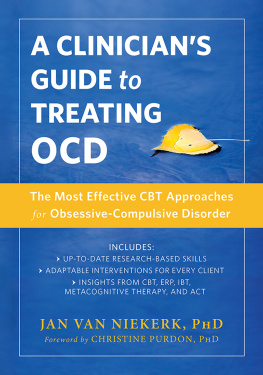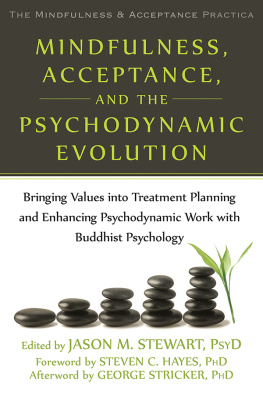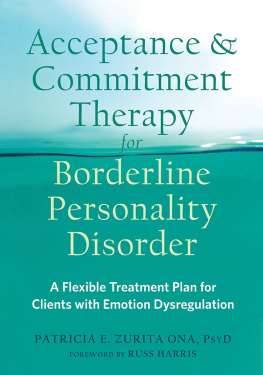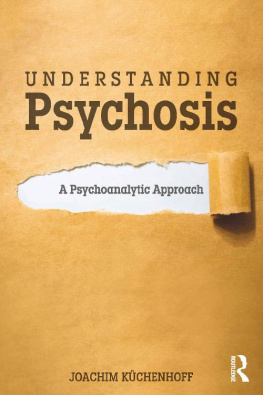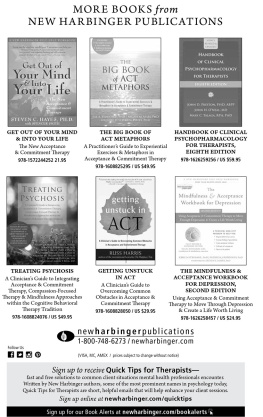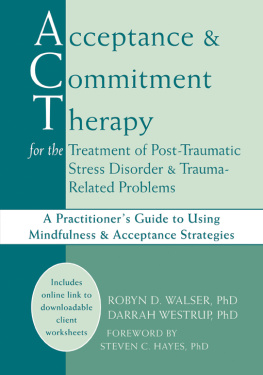
Nicola P. Wright, PhD, CPsych, is a clinical psychologist in the schizophrenia program of the Royal Ottawa Health Care Group (The Royal). She also held the roles of chief of psychology and director of training for the Royals Psychology Residency Program and served as president of the Canadian Council of Professional Psychology Programs. Wright provides individual and group therapy, as well as professional training workshops, integrating acceptance and commitment; mindfulness; and compassion-focused approaches in cognitive behavioral therapy (CBT) for people who experience psychosis. Wright is an active researcher and clinical professor in the School of Psychology at the University of Ottawa and a lecturer with the department of psychiatry, University of Ottawa. In addition, she is a founding member of the Canadian Association of CBT and a staff supervisor with the Beck Institute of CBT. Wright lives in Ottawa, Canada.
Douglas Turkington, MD, is a major research figure within the history of the development of cognitive behavioral therapy (CBT) for schizophrenia. He is a fellow of the Royal College of Psychiatrists and founding fellow of the Faculty of Cognitive Therapy in Philadelphia. He has written more than one hundred articles and more than half a dozen books on the subject of CBT for psychosis. Turkington lives in Newcastle, England.
Owen Kelly, PhD, CPsych,graduated from Carleton University with a specialization in behavioral neuroscience and completed a postdoctoral respecialization in clinical psychology at Fielding Graduate University. He is a clinical psychologist in private practice at the Ottawa Institute of Cognitive Behavioral Therapy. He is currently an adjunct research professor in the department of neuroscience, and lecturer in the department of psychology at Carleton University. Kelly resides in Ottawa, Canada.
Dave Davies, PhD, CPsych, received his doctorate in psychology from Queens University in Kingston, Canada. He is a clinical psychologist and director of training at the Ottawa Institute of Cognitive Behavioral Therapy, and serves as clinical professor in the School of Psychology at the University of Ottawa, and lecturer in the department of psychiatry at the University of Ottawa. He is a founding member of the Canadian Association of Cognitive Behavioral Therapy. Davies lives in Ottawa, Canada.
Andrew M. Jacobs, PsyD, CPsych, received his PsyD in clinical psychology from the Virginia Consortium Program in Clinical Psychology: College of William and Mary, Eastern Virginia Medical School, Norfolk State University, and Old Dominion University, and completed a postdoctoral fellowship in anxiety disorders at McMaster University/St. Josephs Healthcare, Hamilton, Canada. He is clinical psychologist at the Royal Ottawa Health Care Group Anxiety Disorders Program, clinical professor in the School of Psychology at the University of Ottawa, and lecturer in the department of psychiatry at the University of Ottawa. Jacobs lives in Ottawa, Canada.
Jennifer Hopton, MA,is completing her PhD in clinical psychology at the University of Ottawa. Her research and clinical interests are in the areas of trauma, psychosis, substance use, community psychology, program evaluation, and mindfulness. She resides in southern Ontario, Canada.
Foreword author Aaron T. Beck, MD, is the president of the Beck Institute for Cognitive Behavior Therapy, and University Professor Emeritus of Psychiatry at the University of Pennsylvania. Dr. Beck developed cognitive therapy in the early 1960s as a psychiatrist at the University of Pennsylvania. He has published over 500 articles and 19 books and has lectured throughout the world. Dr. Beck is the recipient of many honors from professional and scientific organizations, including Americas Nobel, the Lasker Clinical Medical Research Award.
In Treating Psychosis, Wright and her coauthors provide the reader with a treasure trove of cutting-edge cognitive behavioral therapy (CBT) techniques for treating psychosisall in one succinct volume. Reflecting the evolution of CBT for psychosis over recent years, the authors outline a comprehensive treatment plan that will aid clinicians in making the best use of the myriad psychological strategies that have proven immensely helpful for individuals living with psychosis. The integrative model described in the book expertly links core CBT principles with the latest in mindfulness, acceptance, and compassion-focused strategies, producing an innovative new approach.
Brandon A. Gaudiano, PhD, assistant professor at the Warren Alpert Medical School of Brown University and research psychologist at Butler Hospital in Providence, RI
Building on both established cognitive behavioral research, practice, and treatment for psychosis and emerging work on acceptance-based and related approaches, the authors have put together a clear and highly practical therapist guide for the integrated treatment of psychosis. In addition to a comprehensive discussion of treatment processes and techniques, Treating Psychosis includes more than seventy pages of reproducible forms and handouts. This book is strongly recommended to anyone who treats psychotic disorders, either in groups or individually.
Martin M. Antony, PhD, ABPP, professor of psychology at Ryerson University and author of The Shyness and Social Anxiety Workbook

Publishers Note
This publication is designed to provide accurate and authoritative information in regard to the subject matter covered. It is sold with the understanding that the publisher is not engaged in rendering psychological, financial, legal, or other professional services. If expert assistance or counseling is needed, the services of a competent professional should be sought.
Emotion Regulation Systems diagram from THE COMPASSIONATE MIND by Paul Gilbert, copyright 2009 Paul Gilbert. Reprinted by permission of Constable & Robinson, Ltd.
Form 4.1: Areas to Cover in Assessment adapted from Appendix C in SCHIZOPHRENIA: THEORY, RESEARCH, AND THERAPY by Aaron T. Beck, Neil A. Rector, Neal Stolar, and Paul Grant, copyright 2009 by The Guilford Press. Adapted by permission of The Guilford Press.
Form 6.3: Strategies for Coping with Emotions, Form 8.3: Behavioral Experiments for Distressing Thoughts or Delusions, Form 9.5: Evidence for and Against Beliefs About the Content of Voices, Form 9.6: Evidence for and Against Beliefs About the Cause or Origin of Voices, and Form 9.9: Behavioral Experiment for Beliefs About Voices modified from Evaluating Beliefs About Voices (p. 134), Behavioural Experiments Form (p. 139), and Evaluating Coping Strategies (p. 140) in THINK YOURE CRAZY? THINK AGAIN by Anthony P. Morrison, Julia Renton, Paul French, and Richard Bentall, copyright 2008 Routledge / Taylor & Francis Group. Adapted with permission.
Form 7.2: Activity Form modified from Activity Record in C. W. Lejuez, D. R. Hopko, and S. D. Hopko. (2001). A Brief Behavioral Activation Treatment for Depression: Treatment Manual. Behavior Modification 25(2):255286. Copyright 2001 Sage Publications, Inc. Adapted with permission.
Form 8.2: Pie Chart for Alternative Explanations and Form 9.8: Pie Chart for Explanation of Voices adapted from COGNITIVE THERAPY TECHNIQUES: A PRACTITIONERS GUIDE by Robert L. Leahy, copyright 2003 by The Guilford Press. Adapted by permission of The Guilford Press.
Next page


